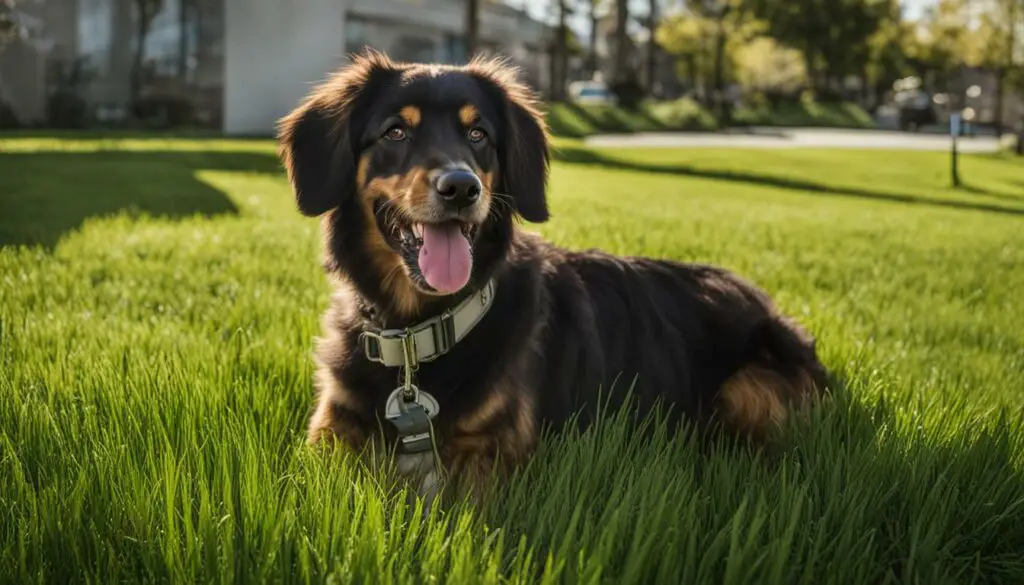Many pet owners have experienced the puzzling behavior of their dogs eating grass frantically. It’s a curious sight that often leaves us wondering why our furry friends engage in this unusual activity. The truth is, there are several reasons behind this behavior, and understanding them can help us address any concerns and provide appropriate solutions.
First and foremost, it’s essential to know that dogs eat grass for various motivations. Curiosity is one common factor, as dogs are naturally inquisitive creatures. They may be attracted to the vibrant color and texture of grass, leading them to explore and even consume it.
Boredom is another possible cause for dogs eating grass. Just like humans, dogs can get bored, and sometimes, they resort to unusual behaviors to alleviate that boredom. Grass eating may provide them with some form of mental stimulation or entertainment.
Gastrointestinal upset is also a potential reason behind this behavior. Some dogs may eat grass as a way to soothe an upset stomach. They consume it at a frantic pace and may even vomit afterward. If your dog exhibits this pattern regularly, it’s important to monitor their behavior and consider any underlying health issues.
Lastly, some dogs simply enjoy the taste and texture of grass. They may prefer certain types of grass over others and find pleasure in chewing and ingesting it. While occasional grass eating is generally considered normal, excessive or frequent consumption may warrant further investigation.
Key Takeaways:
- Dogs may eat grass out of curiosity, boredom, gastrointestinal upset, or enjoyment of taste and texture.
- Excessive grass eating may indicate underlying health issues and should be monitored closely.
- Chemically treated grass and toxic plants can pose a danger to dogs, so it’s important to create a safe environment.
- Consulting a veterinarian is advisable if your dog exhibits frequent or excessive grass eating, or if it is accompanied by other concerning symptoms.
- Diet modifications and providing adequate exercise and mental stimulation can help address grass eating behavior in dogs.
Factors Contributing to Dogs Eating Grass
There are several factors that can contribute to dogs eating grass. Puppies and young dogs may engage in this behavior out of curiosity or boredom. They may be exploring their surroundings and trying different things, including tasting different types of grass. Additionally, dogs may eat grass to alleviate gastrointestinal upset. If they are feeling nauseous or have an upset stomach, they may consume grass in an attempt to induce vomiting and relieve their discomfort. Although not all dogs experience gastrointestinal issues before eating grass, it’s important to observe their behavior and look for patterns or triggers that could indicate underlying health problems.
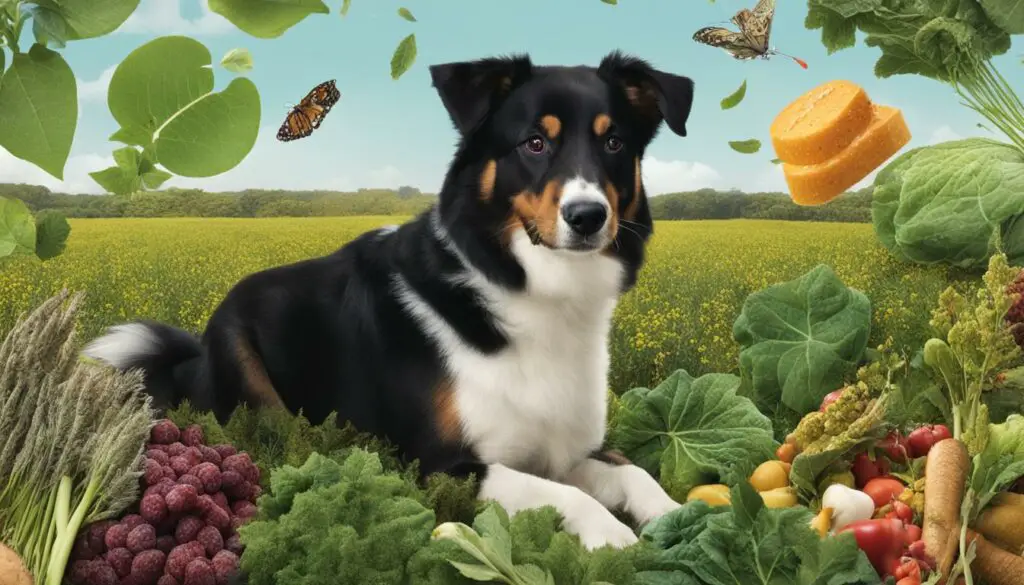
It is normal for dogs to eat grass occasionally, but frequent or excessive grass eating may warrant further investigation. If your dog is consistently eating grass in large amounts or showing signs of distress after consuming it, it may be a sign of an underlying issue. It is essential to monitor their behavior, take note of any symptoms or changes in their health, and consult a veterinarian if necessary. They can provide a proper diagnosis and determine if there are any underlying health conditions contributing to the grass-eating behavior.
Behavioral Causes of Dogs Eating Grass
Should I be concerned if my dog eats grass? Understanding the behavioral causes behind dogs eating grass can help pet owners address this behavior and find ways to manage it. While occasional grass eating is generally considered normal, frequent or excessive grass consumption may indicate underlying issues that require attention. Here are some common behavioral causes of dogs eating grass:
- Boredom: Dogs may eat grass out of boredom, especially if they lack mental and physical stimulation. Providing engaging activities and toys for your dog can help redirect their attention and prevent them from eating grass.
- Curiosity: Some dogs simply enjoy exploring and trying different things, including eating grass. This behavior may be more common in puppies and young dogs as they are still learning about their environment.
- Attention-seeking: Dogs may eat grass to get attention from their owners or as a way to initiate play. This behavior can be reinforced if the owner reacts or gives attention to the dog when they eat grass.
- Nutritional deficiencies: Dogs may eat grass if they are not getting all the essential nutrients from their diet. Ensuring that your dog is on a balanced and nutritious diet can help reduce their inclination to eat grass.
To stop dogs from eating grass, it is important to address the underlying behavioral causes. Providing regular exercise, mental stimulation, and a well-balanced diet can help satisfy your dog’s needs and reduce their desire to eat grass. If the behavior persists or becomes a concern, consulting with a professional dog trainer or veterinarian can provide further guidance and support.
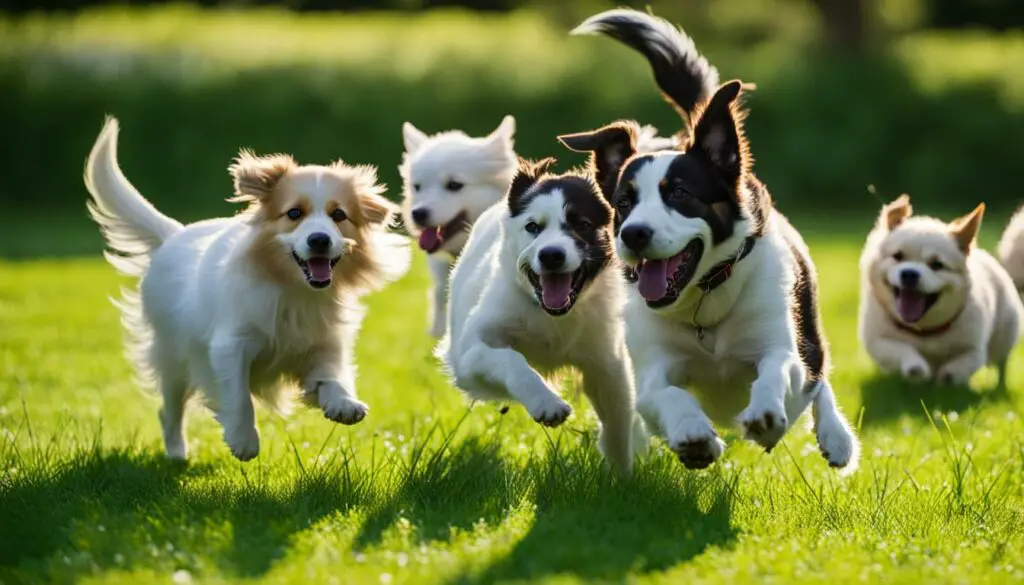
Natural Remedies for Dogs Eating Grass
Dogs eating grass can be a cause for concern for pet owners, especially if it becomes a frequent or excessive behavior. While occasional grass consumption is considered normal, understanding the underlying causes and exploring natural remedies can help address this issue. Additionally, it is crucial to rule out any potential health problems that may be contributing to this behavior.
One natural remedy for dogs eating grass is to provide them with a variety of safe and appropriate chew toys. Offering different textures and tastes can keep dogs engaged and distract them from consuming grass. Puzzle toys that dispense treats can also provide mental stimulation and reduce boredom, which may be a contributing factor to grass eating.
Another approach is to incorporate more fiber into the dog’s diet. This can be achieved by adding certain fruits and vegetables, such as carrots or green beans, to their meals. Increasing fiber intake can help regulate their digestive system and reduce the urge to eat grass. However, it is important to consult with a veterinarian before making any dietary changes to ensure it is suitable for the individual dog.
Seeking professional advice is always recommended if the dog’s grass eating behavior persists or is accompanied by other concerning symptoms. A veterinarian can assess the dog’s overall health and provide personalized guidance and treatment options. They may suggest additional natural remedies or recommend further diagnostic tests to identify any underlying issues.
Is Grass Eating Dangerous for Dogs?
Many pet owners may wonder, “Should I be concerned if my dog eats grass?” While occasional grass eating is generally not harmful, it is essential to understand the potential dangers associated with this behavior. By being aware of the reasons for dogs eating grass and taking necessary precautions, you can help ensure your dog’s safety and well-being.
One of the main concerns about grass eating is the possibility of chemical exposure. Pesticides, herbicides, and fertilizers used on lawns can be toxic if ingested by dogs. It is important to avoid areas that have been treated with chemicals and to carefully select grassy spaces where your dog can roam freely. Additionally, certain plants and fungi found in grassy areas can be poisonous to dogs, posing a risk if consumed.
To better understand the potential dangers, here is a table summarizing the common hazards associated with grass eating:
| Potential Dangers of Grass Eating for Dogs | How to Minimize the Risk |
|---|---|
| Chemical exposure from pesticides, herbicides, or fertilizers | Avoid chemically treated areas and opt for organic or untreated grassy spaces. |
| Ingestion of toxic plants or fungi present in grassy areas | Remove toxic plants from your dog’s environment and supervise them during outdoor activities. |
By being aware of these potential dangers and taking appropriate precautions, you can help keep your dog safe while still allowing them to enjoy the benefits of grassy areas during playtime and outdoor exploration.
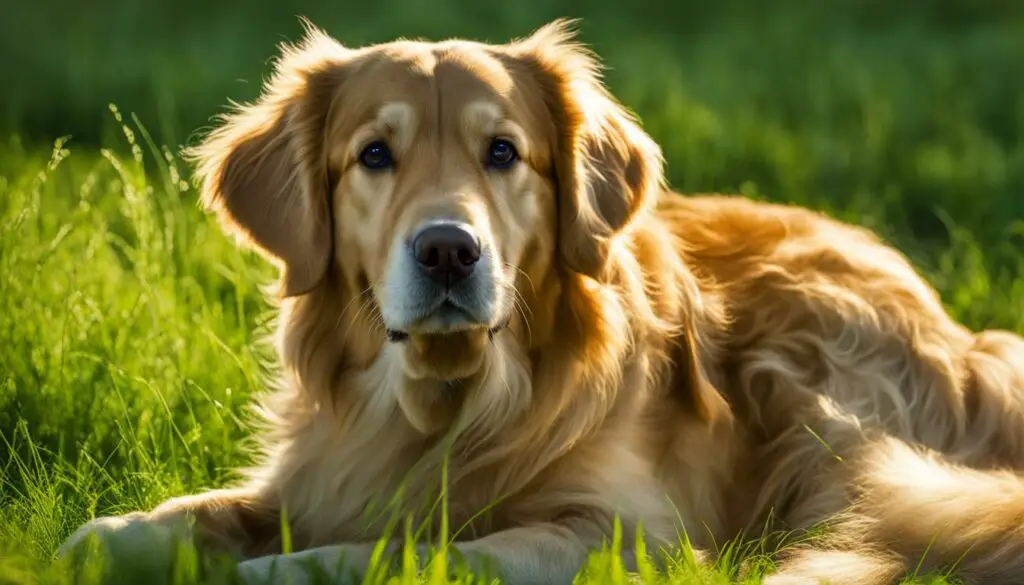
Identifying Selective Eating Vs. Frantic Eating
When observing a dog’s behavior of eating grass, it is important to differentiate between selective eating and frantic eating. Selective eating refers to dogs choosing specific types of grass and exhibiting a relaxed and deliberate behavior while doing so. They may take their time, carefully selecting which blades of grass to consume. On the other hand, frantic eating involves dogs consuming grass in a hurried and anxious manner, often without being selective about the type of grass. They may eat grass in large quantities and at a rapid pace.
The distinction between selective eating and frantic eating is crucial because it can provide insights into the dog’s well-being and potential underlying issues. If a dog is selectively eating grass, it is less likely to be a cause for concern. They may simply enjoy the taste or have a preference for certain types of grass. However, if a dog is frantically eating grass, it may indicate discomfort or gastrointestinal upset.
If you notice your dog engaging in frantic eating behaviors, it is essential to monitor their overall health and behavior. Are they exhibiting any other symptoms such as vomiting, diarrhea, or signs of discomfort? If so, it may be wise to consult with a veterinarian to rule out any underlying health issues and determine the best course of action to address their grass eating behavior.
Identifying Selective Eating Vs. Frantic Eating
It is essential to differentiate between selective eating and frantic eating when it comes to dogs consuming grass. Selective eating refers to dogs choosing specific types of grass and exhibiting a relaxed and deliberate behavior while doing so. On the other hand, frantic eating involves dogs consuming grass in a hurried and anxious manner, often without being selective about the type of grass. It is important to pay attention to your dog’s behavior and take note of any patterns or accompanying symptoms to determine whether their grass eating is a cause for concern.
Seeking Veterinary Advice for Dogs Eating Grass
If your dog exhibits frequent or excessive grass eating, or if it is accompanied by other concerning symptoms, it is advisable to seek veterinary advice. As a responsible pet owner, it is important to prioritize your dog’s health and well-being. A veterinarian can assess your dog’s overall health and identify any underlying issues that may be contributing to their grass eating behavior. They can provide you with appropriate guidance and treatment options based on their professional expertise.
When you consult a veterinarian, they may recommend dietary adjustments, behavioral interventions, or further diagnostic tests if necessary. They can help you determine if there are any nutrient deficiencies or underlying health conditions that need to be addressed. By working closely with a veterinarian, you can ensure that the most effective and personalized approach is taken to address your dog’s grass eating behavior.
Remember, veterinary advice should always be sought if you have concerns about your dog’s health or behavior. They have the expertise and experience to provide you with accurate information and guidance specific to your dog’s individual needs. Regular check-ups and open communication with your veterinarian are important to keep your furry friend happy and healthy.
| Signs to look out for: | Reasons to seek veterinary advice: |
|---|---|
| Excessive grass eating | Underlying health issues |
| Changes in appetite or weight | Nutritional deficiencies |
| Vomiting or diarrhea | Gastrointestinal problems |
| Lethargy or weakness | Possible toxin exposure |
It’s always better to be safe than sorry. Your veterinarian is your best resource for addressing any concerns or problems related to your dog’s grass eating behavior. They can help ensure your dog receives the appropriate care and support, keeping them happy and healthy for years to come.
Diet Modifications to Address Grass Eating
When it comes to addressing your dog’s grass eating behavior, diet modifications can play a significant role. By ensuring your dog’s diet is well-balanced and includes the necessary nutrients, you can help reduce their inclination to eat grass out of nutritional deficiency.
One effective strategy is to add fiber-rich foods or probiotics to their diet. These can provide digestive support and reduce the dog’s reliance on grass consumption. Fiber helps regulate bowel movements and can prevent gastrointestinal discomfort that may lead to excessive grass eating.
Consulting with a veterinarian is essential to determine the best dietary approach for your individual dog. They can assess their overall health and specific nutritional needs, taking into account factors such as age, breed, and any underlying medical conditions. Your vet may recommend specific commercial dog foods, natural supplements, or homemade recipes tailored to address your dog’s grass eating behavior.

| Diet Modifications Tips | Benefits |
|---|---|
| Include high-quality dog food | Provides essential nutrients and minimizes nutritional deficiencies |
| Add fiber-rich foods (e.g., pumpkin, sweet potato) | Promotes healthy digestion and reduces the need for grass consumption |
| Introduce probiotics | Improves gut health and aids in digestion |
| Consult with a veterinarian | Ensures a personalized dietary plan to address your dog’s specific needs |
Remember, diet modifications alone may not completely eliminate grass eating behavior, especially if there are other underlying factors involved. It’s important to address any behavioral or medical issues in conjunction with dietary adjustments to achieve the best results.
Potential Dangers of Grass Eating for Dogs
While occasional grass eating is not typically harmful, it is important for pet owners to be aware of the potential dangers associated with excessive grass consumption. One of the main concerns is the presence of chemicals on treated grass. Pesticides and herbicides used on lawns can be toxic if ingested by dogs. It is crucial to avoid allowing dogs to consume grass that has been recently treated or where chemical treatments have been applied.
Additionally, certain plants and fungi found in grassy areas can be poisonous to dogs. These include plants such as azaleas, lilies, and daffodils, which can cause serious health issues if ingested. To ensure the safety of dogs in grassy environments, it is essential for pet owners to be knowledgeable about toxic plants and prevent their dogs from accessing them. Regularly inspecting the surroundings and removing any potential hazards can help protect dogs from accidental ingestion.
| Danger | Prevention |
|---|---|
| Chemical treatments on grass | Avoid allowing dogs to access recently treated grass or areas with chemical treatments. |
| Toxic plants | Be knowledgeable about toxic plants that are commonly found in grassy areas and prevent dogs from accessing them. |
| Outdoor hazards | Regularly inspect the surroundings and remove any potential outdoor hazards that may harm dogs. |
To ensure the well-being of dogs, it is crucial for pet owners to create a safe environment that minimizes the risks associated with grass eating. By being vigilant and taking necessary precautions, pet owners can help protect their dogs from potential dangers and ensure their overall safety and health.
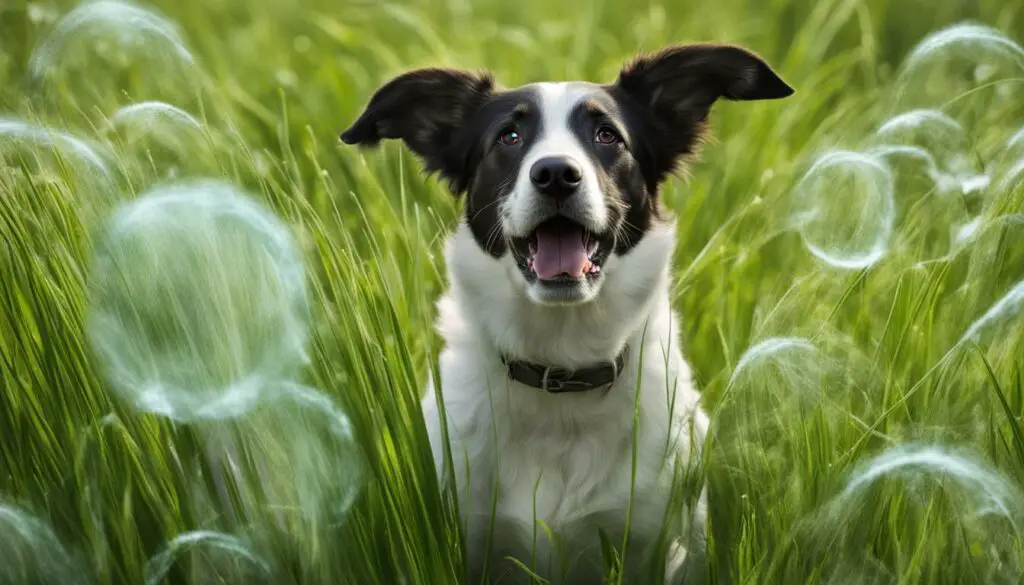
Understanding the Motivations Behind Dogs Eating Grass
Many pet owners have observed their dogs eating grass at some point, and it often leaves them wondering why. Dogs exhibit this behavior for various reasons, ranging from natural instincts to health issues. Understanding the motivations behind dogs eating grass can help pet owners address any concerns and provide appropriate solutions.
One common reason why dogs eat grass is out of curiosity. They explore their surroundings with their mouths, and grass can be an interesting texture for them to interact with. Additionally, dogs may eat grass when they are bored or seeking stimulation. Providing alternative activities and engaging toys can help redirect their attention and reduce grass consumption.
Gastrointestinal upset can also lead to dogs eating grass. When dogs have an upset stomach, they may instinctively turn to grass as a way to induce vomiting and relieve discomfort. If a dog consistently eats grass and vomits afterward, it may be a sign of an underlying digestive issue that requires veterinary attention.
| Reasons for Dogs Eating Grass | Explanation |
|---|---|
| Curiosity and exploration | Dogs may be intrigued by the texture and taste of grass. |
| Boredom and seeking stimulation | Providing engaging activities and toys can help redirect their attention. |
| Gastrointestinal upset | Dogs may eat grass to induce vomiting and relieve discomfort in their stomach. |
Overall, dogs eat grass for a combination of reasons, including curiosity, boredom, and gastrointestinal upset. While occasional grass consumption is generally considered normal, frequent or excessive grass eating may warrant further investigation. Pet owners should monitor their dog’s behavior, provide appropriate stimulation and enrichment, and consult with a veterinarian if necessary, to ensure their furry friends’ well-being.

The Role of Exercise and Mental Stimulation
Ensuring that dogs receive adequate exercise and mental stimulation is essential in preventing them from eating grass out of boredom or frustration. Regular physical activities such as walking, running, or playing fetch can help tire dogs both mentally and physically, reducing their inclination to consume grass excessively. Engaging in interactive play sessions, such as puzzle toys or hide-and-seek games, can also stimulate their minds and fulfill their natural instincts.
By providing a variety of toys and activities, pet owners can keep their dogs mentally stimulated and occupied, reducing the likelihood of them turning to grass as a form of entertainment. Puzzle toys, treat-dispensing toys, or interactive games can keep dogs engaged and provide mental challenges, preventing boredom-induced grass eating. Additionally, using positive reinforcement training techniques can help redirect their attention and teach them alternative behaviors.
The Importance of Routine and Structure
Establishing a regular routine and structure for dogs can also contribute to reducing their grass consumption. Dogs thrive on consistency, and a predictable daily schedule can help alleviate stress and anxiety, which are common triggers for excessive grass eating. Ensuring that dogs have designated meal times, exercise periods, and rest times can provide them with a sense of security and reduce the likelihood of them engaging in destructive behaviors such as grass eating.
Implementing obedience training and basic commands can also help establish boundaries and reinforce desirable behaviors. Teaching commands such as “leave it” or “drop it” can be beneficial in redirecting their attention away from grass and toward more appropriate activities. Rewarding positive behaviors with treats, praise, or playtime can further reinforce the desired responses and encourage dogs to engage in alternative behaviors instead of grass consumption.
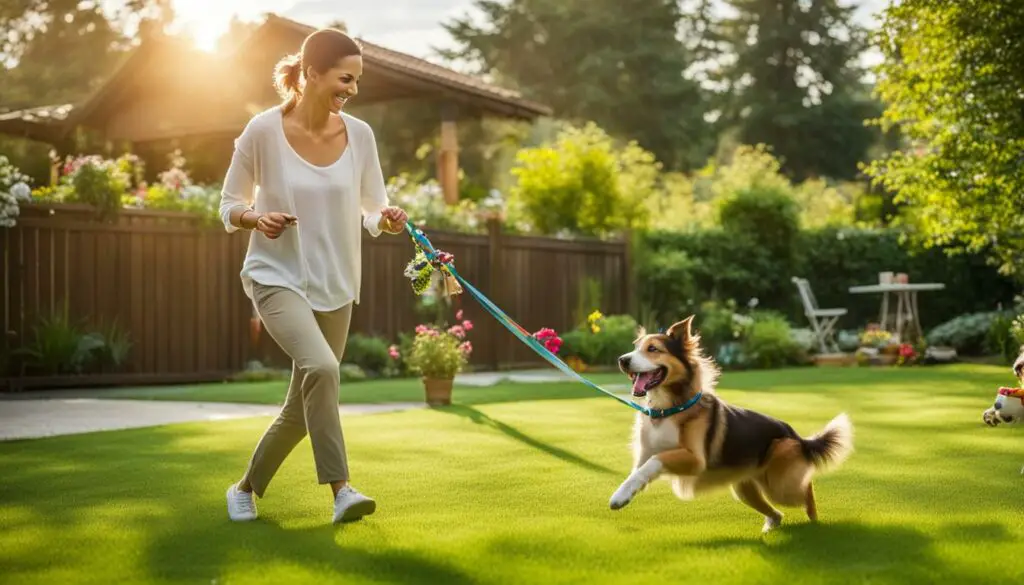
Creating a Safe and Enriching Environment
Creating a safe and enriching environment is crucial in preventing dogs from eating grass excessively. Pet owners should ensure that their dogs have access to a secure and well-maintained outdoor space, free from toxic plants and chemicals. Regularly inspecting the yard or garden for any potentially harmful substances, such as pesticides or herbicides, and removing them promptly can help protect the dog’s health.
Providing a variety of engaging toys, chew bones, and interactive activities both indoors and outdoors can help divert the dog’s attention away from grass eating. Introducing novel stimuli, such as scent games or puzzle toys, can also provide mental enrichment and prevent boredom-related grass consumption. Additionally, spending quality time with the dog through play sessions, training, or bonding activities can strengthen the human-animal bond and reduce any underlying anxiety or stress that may contribute to grass eating.
Promoting a Safe Environment for Dogs
Pet owners have a crucial role to play in creating a safe environment for their furry companions, particularly when it comes to their grass-eating habits. While occasional grass consumption is generally considered normal, it’s important to be aware of potential dangers and take preventative measures to ensure the health and well-being of our dogs.
One significant concern is the presence of chemicals on treated grass. Pesticides and herbicides commonly used on lawns can pose a serious risk if ingested by dogs. It is essential to avoid letting our dogs access areas where grass has been chemically treated. Additionally, toxic plants can also be found in some grassy areas. Familiarize yourself with potential poisonous plants and ensure they are removed from your dog’s environment to prevent any accidental ingestion.
In order to promote a safe environment, regular inspection and maintenance is necessary. Keep an eye out for any hazards that may arise, such as broken glass, sharp objects, or potentially harmful substances. It’s important to be proactive and take immediate action to remove any potential risks. By doing so, we can create a safe space for our dogs to enjoy without the worry of them consuming dangerous substances.
| Potential Hazards | Preventative Measures |
|---|---|
| Chemically treated grass | Avoid areas with chemically treated grass and opt for natural or untreated grassy areas. |
| Toxic plants | Identify and remove any toxic plants from your dog’s environment. |
| Broken glass or sharp objects | Regularly inspect and clean the area where your dog has access to grass. |
| Potentially harmful substances | Keep hazardous substances securely stored and away from your dog’s reach. |
By taking these precautions and creating a safe environment, pet owners can ensure that their dogs can enjoy their grassy surroundings without the risk of ingesting harmful substances. Remember, a safe and secure environment is essential for your dog’s overall well-being.
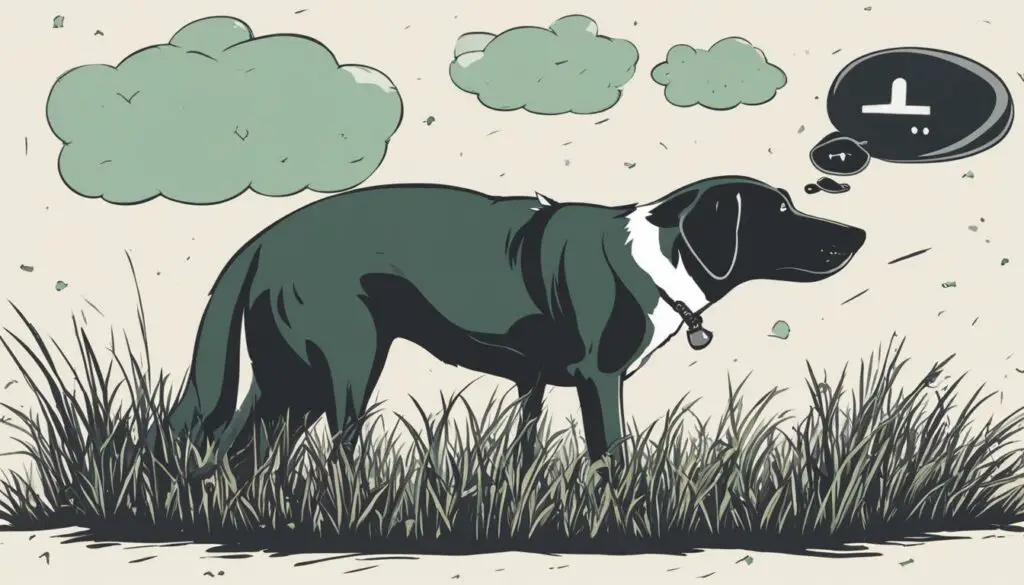
Conclusion
After exploring the various reasons why dogs eat grass frantically, it is clear that this behavior is not uncommon. Curiosity, boredom, gastrointestinal upset, and the enjoyment of the taste and texture of grass can all contribute to this behavior. As pet owners, it is important for us to understand these motivations in order to address any concerns and provide appropriate solutions.
If your dog exhibits frequent or excessive grass eating, it may be worth seeking veterinary advice. A veterinarian can assess your dog’s health and determine if there are any underlying issues that need to be addressed. They may also recommend diet modifications, behavioral interventions, or further tests if necessary.
In addition, ensuring that your dog receives adequate exercise and mental stimulation can help reduce their inclination to eat grass out of boredom or frustration. Providing a safe environment, free from chemicals and toxic plants, is also crucial for their well-being.
By taking a proactive approach and addressing the underlying cause of grass eating, we can improve our dogs’ overall quality of life and reduce the need for excessive grass consumption. Remember, occasional grass eating is generally considered normal, but if you have any concerns, it is always best to consult with a veterinarian. Together, we can keep our furry companions happy and healthy!
FAQ
Why does my dog eat grass?
There are several reasons why dogs eat grass, including curiosity, boredom, gastrointestinal upset, and enjoyment of the taste and texture.
Is it normal for dogs to eat grass?
Yes, occasional grass eating is considered normal for dogs. However, frequent or excessive grass consumption may indicate underlying issues that require attention.
Should I be concerned if my dog eats grass?
It depends on the frequency and behavior associated with grass eating. If your dog exhibits frantic or aggressive grass eating, it may be cause for concern and should be monitored closely.
How can I stop my dog from eating grass?
To discourage grass eating, you can provide alternative activities, ensure a balanced diet, and seek professional advice if necessary. Identifying the underlying cause can help address the behavior effectively.
Are there any health-related reasons why dogs eat grass?
Yes, some dogs eat grass to alleviate gastrointestinal upset. Grass consumption can serve as a natural way for dogs to purge their bodies. Adding fiber to their diet can help alleviate excessive grass eating in some cases.
Is eating grass dangerous for dogs?
While occasional grass eating is not typically harmful, pet owners should be cautious about the type of grass their dog consumes and the potential presence of pesticides, herbicides, or toxic plants. Chemical treatments on lawns and certain plants can be toxic if ingested.
How can I tell if my dog is selectively eating grass or eating it frantically?
Selective eating involves dogs choosing specific types of grass and exhibiting a relaxed and deliberate behavior. Frantic eating, on the other hand, involves dogs consuming grass in a hurried and anxious manner, often without being selective about the type of grass.
When should I seek veterinary advice for my dog eating grass?
If your dog exhibits frequent or excessive grass eating, or if it is accompanied by other concerning symptoms, it is advisable to seek veterinary advice. A veterinarian can assess your dog’s health and provide appropriate guidance and treatment options.
Can diet modifications help address grass eating?
Yes, adjusting your dog’s diet can be a helpful strategy to address grass eating. A high-quality diet with sufficient fiber and essential nutrients may reduce the dog’s inclination to eat grass out of nutritional deficiency.
Are there any potential dangers associated with grass eating for dogs?
Yes, grass that has been treated with chemicals or certain plants and fungus present in grassy areas can be toxic to dogs. It is important to be aware of your dog’s environment and remove any potential hazards.
Why do dogs eat grass?
Dogs eat grass for various reasons, including curiosity, boredom, gastrointestinal upset, and the enjoyment of taste and texture. Understanding these motivations can help address concerns and take appropriate action.
How can exercise and mental stimulation help reduce grass eating?
Ensuring that dogs receive adequate exercise and mental stimulation can help reduce their inclination to eat grass out of boredom or frustration. Regular physical exercise and engaging activities can tire dogs both mentally and physically.
How can I promote a safe environment for my dog to prevent dangers associated with grass eating?
To promote a safe environment, avoid chemically treated grass, keep an eye out for toxic plants, and ensure your dog does not consume excessive amounts of grass. Regularly inspect your dog’s environment and remove any potential hazards.
Dog eating grass frantically: What’s the best course of action?
By identifying the underlying cause of grass eating, pet owners can take proactive steps to improve their dog’s overall well-being and reduce the need for excessive grass consumption. Consulting a veterinarian and implementing appropriate solutions can provide relief and improve the dog’s quality of life.

